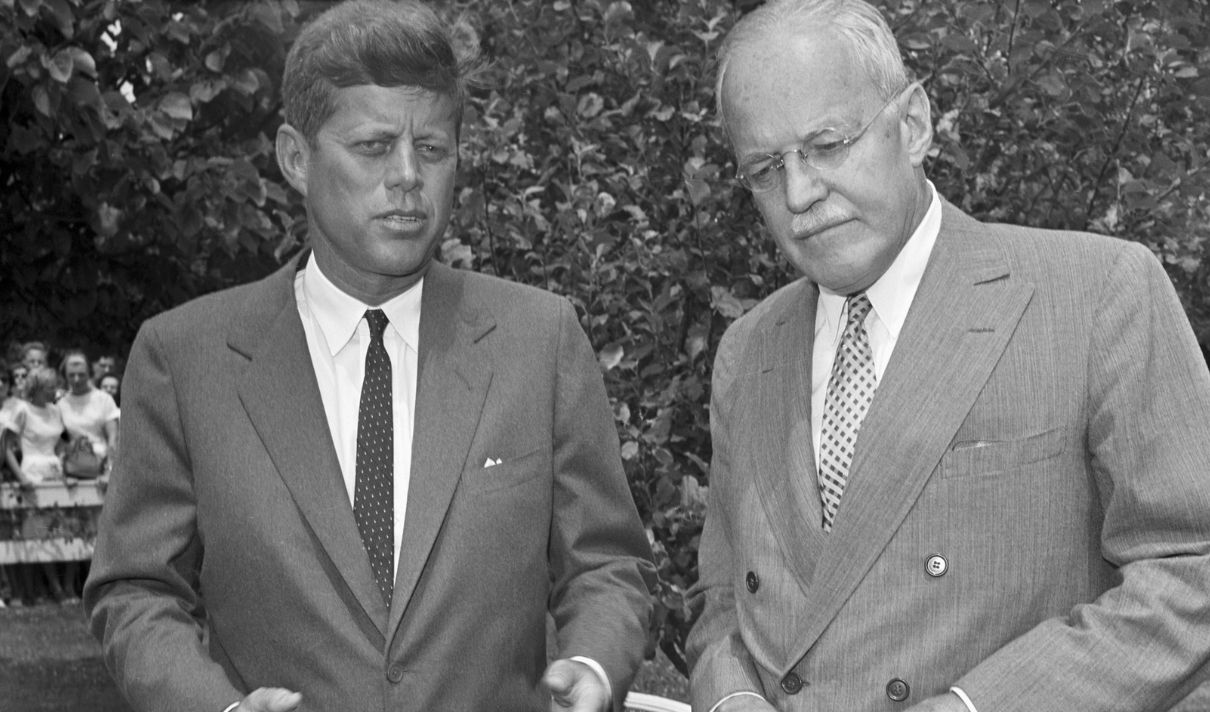The CIA by Hugh Wilford: 'lively and original' history of America's spy agency
The book has been dubbed a 'must-read' for those interested in intelligence and national-security affairs

A free daily email with the biggest news stories of the day – and the best features from TheWeek.com
You are now subscribed
Your newsletter sign-up was successful
There has long been a "dichotomy" in histories of the CIA, said Toby Harnden in The Spectator. While some have depicted America's foreign spying agency (founded by President Truman in 1947) as an "all-powerful evil force", others have presented it as "comically inept".
The former accounts emphasise the argument that the CIA is "pulling the strings" everywhere. The latter highlights its "pratfalls" and "madcap schemes" – such as its ill-fated plot to assassinate Fidel Castro with exploding cigars, or its plan to discredit President Sukarno of Indonesia by faking his appearance in a porn film. In this fascinating new history, Hugh Wilford falls into "neither camp".
A British historian who moved to California State University in 2006, Wilford is an "admirably fair-minded and dispassionate" guide. And he offers up a "lively and original thesis" – that the CIA is essentially an "imperial" body, which carried on much of the work that European intelligence services had done in the colonial era.
The Week
Escape your echo chamber. Get the facts behind the news, plus analysis from multiple perspectives.

Sign up for The Week's Free Newsletters
From our morning news briefing to a weekly Good News Newsletter, get the best of The Week delivered directly to your inbox.
From our morning news briefing to a weekly Good News Newsletter, get the best of The Week delivered directly to your inbox.
Wilford argues that the "shadow of empire" informed everything the early CIA did, said Theo Zenou in The Sunday Times. Its agents were raised on "heroic tales of British empire"; many of them were devotees of T.E. Lawrence and Rudyard Kipling. Allen Dulles, the CIA's long-time boss, had a "well-thumbed copy" of "Kim" – Kipling's 1901 masterpiece about a British spy in India – on his bedstand when he died in 1969. Such a culture, Wilford argues, made it natural for the CIA to function as the "secret weapon" of an increasingly imperialistic American state. From Vietnam to Guatemala, the agency "propped up pro-American regimes, toppled anti- American ones and spread American power". Written with "clarity and nuance", this is a "gripping" and comprehensive history.
Wilford's account gives "fresh context" to such well-known chapters in the CIA's history as the 1953 coup in Iran, its covert action in Guatemala in 1954, and the "fiasco" of the Bay of Pigs invasion of Cuba in 1961, said Calder Walton in The Telegraph. Yet his book is by no means flawless. It's odd that he pays so little attention to the KGB's actions "in faraway lands", which generally "far outstripped the corresponding CIA activities". And his attempts to view more recent US actions through an imperial lens – such as the war in Afghanistan after 9/11 – are not wholly convincing. Nonetheless, his book is "important and engrossing" – and a must-read for "anyone interested in intelligence and national-security affairs today".
A free daily email with the biggest news stories of the day – and the best features from TheWeek.com
-
 The ‘ravenous’ demand for Cornish minerals
The ‘ravenous’ demand for Cornish mineralsUnder the Radar Growing need for critical minerals to power tech has intensified ‘appetite’ for lithium, which could be a ‘huge boon’ for local economy
-
 Why are election experts taking Trump’s midterm threats seriously?
Why are election experts taking Trump’s midterm threats seriously?IN THE SPOTLIGHT As the president muses about polling place deployments and a centralized electoral system aimed at one-party control, lawmakers are taking this administration at its word
-
 ‘Restaurateurs have become millionaires’
‘Restaurateurs have become millionaires’Instant Opinion Opinion, comment and editorials of the day
-
 Kia EV4: a ‘terrifically comfy’ electric car
Kia EV4: a ‘terrifically comfy’ electric carThe Week Recommends The family-friendly vehicle has ‘plush seats’ and generous space
-
 Bonfire of the Murdochs: an ‘utterly gripping’ book
Bonfire of the Murdochs: an ‘utterly gripping’ bookThe Week Recommends Gabriel Sherman examines Rupert Murdoch’s ‘war of succession’ over his media empire
-
 Gwen John: Strange Beauties – a ‘superb’ retrospective
Gwen John: Strange Beauties – a ‘superb’ retrospectiveThe Week Recommends ‘Daunting’ show at the National Museum Cardiff plunges viewers into the Welsh artist’s ‘spiritual, austere existence’
-
 Travel for all: 6 of the world’s most accessible destinations
Travel for all: 6 of the world’s most accessible destinationsThe Week Recommends Experience all of Berlin, Singapore and Sydney
-
 Bad Bunny’s Super Bowl: A win for unity
Bad Bunny’s Super Bowl: A win for unityFeature The global superstar's halftime show was a celebration for everyone to enjoy
-
 Book reviews: ‘Bonfire of the Murdochs’ and ‘The Typewriter and the Guillotine’
Book reviews: ‘Bonfire of the Murdochs’ and ‘The Typewriter and the Guillotine’Feature New insights into the Murdoch family’s turmoil and a renowned journalist’s time in pre-World War II Paris
-
 The 8 best TV shows of the 1960s
The 8 best TV shows of the 1960sThe Week Recommends The standout shows of this decade take viewers from outer space to the Wild West
-
 The year’s ‘it’ vegetable is a versatile, economical wonder
The year’s ‘it’ vegetable is a versatile, economical wonderthe week recommends How to think about thinking about cabbage